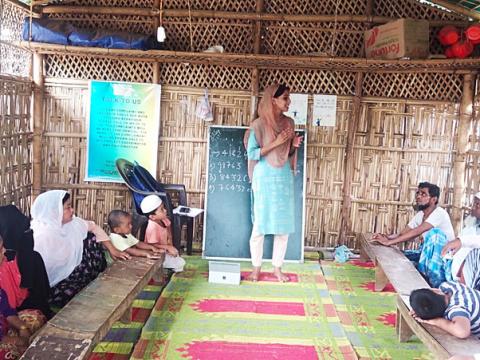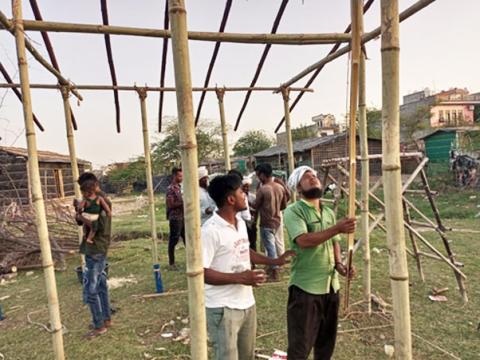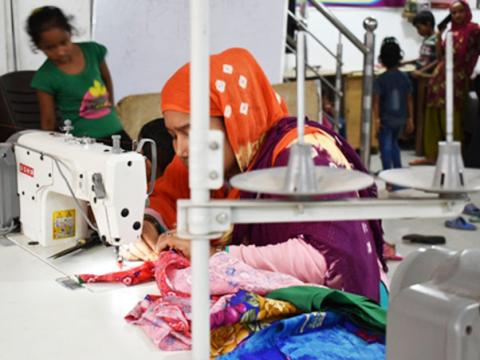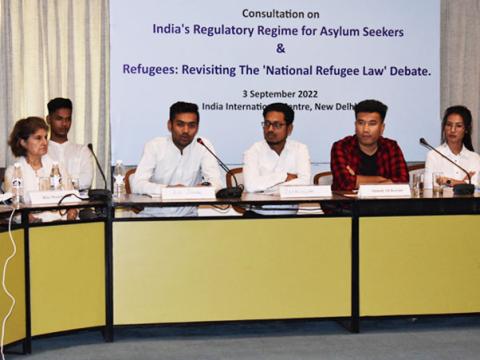The program includes working directly with refugee communities, health and education service providers, lawyers and legal aid institutions as well as conducting research, documentation and building networks of people interested in strengthening refugee rights.
DAJI has been implementing RPAS since 2012. The program mainly focuses on increasing the access of refugees to health and education services as well as provide counselling on protection and legal issues. Since 2021 the organisation is also implementing a livelihood support program. Starting community-based projects in 2014 from Jammu, Mewat (Haryana) and Jaipur (Rajasthan), our current (2021-23) projects are implemented in Mewat, Jaipur, Punjab and Delhi. During the COVID-19 pandemic our focus has been on restoring access to health services and assist in economic recovery for the refugee community. As a part of the project, we work with local service providers to educate them on refugee situations and work with the host communities to nurture peaceful co-existence of refugees with them.
In the more than ten years since this program started, we have worked with more than 20,000 refugees, 18 health institutions, 22 government schools and District Legal Services Authority (DLSA) in 5 districts across four states. We have supported the education of more than 5000 children by supporting their admission and retention in schools. A special focus of DAJI is on facilitating access for refugee children to the National Institute of Open Schooling (NIOS), providing them with coaching classes and logistical support in attending examinations
As a part of the program DAJI also engages in documentation, research, advocacy and networking with stakeholders interested in refugee protection. DAJI is an organisational member of the Asia Pacific Refugee Rights Network (APRRN) and works together with other national organisations and refugee-led groups to strengthen refugee protection regimes in the Asia Pacific region.
See the section on publications to check our research reports.
2022-23 programs
- Community based work
Currently DAJI works with refugees in Jaipur, Rajasthan, in partnership with UNHCR to provide support to refugees in accessing health and education services and train them and increase their livelihood options. We serve more than 180 families of refugees with a focus on child protection and prevention and redress of SGBV. Asylum Seekers and refugees are also supported in getting appropriate UNHCR documentation. We work with several other NGOs, livelihood agencies and other stakeholders to facilitate their support to the refugees.
Our work in Mewat (Haryana) and Dera Bassi (Punjab) focuses on supporting the refugee communities in recovery from health and economic impacts of COVID19. In Delhi we work with new arrivals of Chin community asylum seekers and provide them with support to access health services. The broader framework of COVID19 recovery also includes child protection, access to education, Hindi language learning classes for women and social cohesion with host communities. We provide livelihood grants to refugees and support them in running small enterprises to enhance their livelihoods. In 2022, 35 refugees were supported with grants to run small enterprises.
- Research, advocacy and networking
As a part of DAJI’s objective of strengthening the legal protection and recognition of asylum seekers and refugees, the organisation reached out to India’s National Human Rights Commission (NHRC) in April 2022 to contribute to their efforts in advocating for a domestic law for refugee protection in India. A research paper was developed that discussed the history of refugee protection in South Asia and efforts made in the past to strengthen protection and issues that emerged in the last couple of decades.
The research paper and a concept note were discussed at a ‘National Consultation on Refugee Rights and Need for a Legal and Policy Framework’ organised jointly by DAJI, South Asia Forum for Human Rights and India International Centre, Delhi, on 3 September 2022. The consultation included academics, advocates, media persons, civil society actors and refugees. Participants of the one-day consultation issued a ‘recommended policy framework for determination of status, protection and treatment of refugees and asylum seekers in India’. The same has been sent for consideration of relevant authorities among the UN and government of India system.




